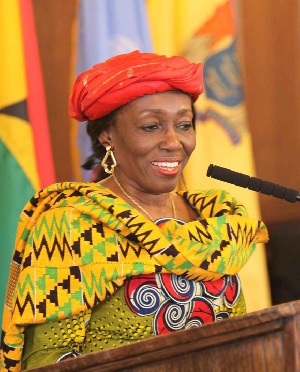Ghana’s former first lady, Nana Konadu Agyeman Rawlings, has suggested that it is best for people to marry persons within their age bracket and also to marry only when they are really sure they are ready for it.
Nana Konadu said couples whose ages are not too far apart are likely to understand each other better and plan their future together.
“When you are 45 and you marry an 18-year-old, how can you plan? There are some things you may want to discuss with her about your business but her mind may be somewhere else and not properly understand what you mean. Leave the 18-year-olds to be married by the 22-year-olds and go for your age mates.
“I am not saying younger persons do not make good partners but in most instances, marriages work better when you marry someone whose age is not too far from yours. My husband and I are not too far apart in terms of age,” Nana Konadu noted on Homebase TV’s morning show hosted by Kobi Hemaa Osisiadan-Bekoe.
She continued: “First, ask yourself if you are ready to marry. I have seen young men who got married because of pressure from their parents, then they just decided to marry whoever they had dated for long. But after the marriage, excuse me to say, they abandon the wife at home and they start to go round doing things that are not right.
“If you are not ready to marry, don’t be in a rush to marry. Wait and make sure you are genuinely ready to marry. I am not saying (married) couples are all perfect; neither am I saying my husband is an angel. No, that is not what I am saying. But before you settle down with a life partner, you have to think about it a thousand and one times. Marry in honesty, togetherness, and for lifetime,” Nana Konadu added.
Mrs Rawlings turns 68 in November this year and she explained how she has maintained a sleek figure and appears far younger that her age: “Maybe it is my face that has not changed much but the body is not as strong as when I was much younger. We should try to eat the right foods and at the right time. For example, I take fufu just about once a month and it is just a little size but with a lot of soup. We need to take our health seriously because it is very necessary.”
The former first lady, speaking on the morning show, ‘Ebuboba’, gave a nostalgic narration of some experiences she had during her secondary school days at Achimota School and when students were not only taken through academic tutelage but comprehensive education.
“I was very good at sports: I was a good sprinter, I played netball, I did swimming. But I did not do well in hockey because I was scared they would use the hockey sticks to hit my legs. There was a saying that when you miss the ball, don’t miss the leg of the player. I even still have such marks on my legs. So I was scared. But hockey was compulsory.
“I also took part in school extracurricular activities. In Achimota, they told us that we were not in the school only for academics. For them education meant music, sports, classroom work, arts, craft and I learnt to do pottery at Achimota School. I even learnt carpentry at Achimota School,” she disclosed.
Opera Or No School
“In those days, when you went through Achimota School, you became an all-round student and not just an academic. We did operas and operettas. I remember when I was in lover sixth form, I was selected to be the lead singer in one of the operas and I told the teacher I could not do it because there was so much work for me. I explained to the teacher that I was the compound prefect, I was in sixth form and I had academic work to do.
“The teacher asked if I knew the school in which I was. I smirked and responded in the affirmative. By evening, my father had been invited to the school and I was given the option to either lead the opera performance in addition to my academic work and other duties or I should leave the school.
“My father was an old Achimotan and he was surprised at my behaviour. He said I should combine.
“That was education. In those days, it was not only about book and passing examination. There were other things you learnt and became a better person. School was not just about academic work. You were taught to become a good sports person, a good actor, a good instrumentalist and other things.
RAWLINGS
“I actually met Rawlings in another school. But I was taken from that school. My mother took me to an experimental school for some time, then she took me to Ghana International School, then I wrote my Common Entrance and went to Achimota School. It was in between those schools that I met Rawlings. But he noticed me at Achimota School. We were in the same class.”
Entertainment of Thursday, 10 March 2016
Source: dailyguideafrica.com

















